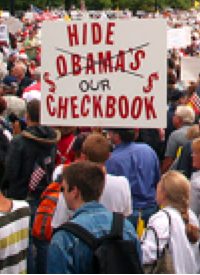
Media accounts of the Tea Party phenomenon generally associate the movement with the Republican Party. However, a public opinion poll released the beginning of April found that the Tea Party may be less Republican than many assume. According to the poll, though a majority (57 percent) of Tea Partiers call themselves Republican, 28 percent identify themselves as Independent and another 13 percent as Democrat.
These findings were reported by the Winston Group, which conducted three national telephone surveys of 1,000 people per month during the months of December 2009 through February 2010.
The Winston Group poll also found that the Tea Party movement enjoys significant support. Of the 3,000 poll participants, 17 percent answered “yes” when asked if they “considered themselves part of the Tea Party Movement.”
The April 1 Winston Group memo announcing the survey results said the survey shed light on two critical questions confronting those hoping to understand the movement: Who are the “Tea Party members” and what ideas matter to them? It went on to say that, in short, the Tea Party movement is an economically conservative coalition that is not homogenous in its makeup and includes those of all political parties. The memo states that while voters overall are concerned with the economy and jobs, Tea Party members were over twice as likely to name “national deficit/spending” as their top issue. “The economy remains a top priority with the Tea Party participants,” the memo went on, “but concern with the deficit is pronounced with this group, underscoring the unifying thread of economic conservatism that runs through the Tea Party movement.”
The Winston Group poll found that 56 percent of Tea Party members were male and 44 percent were female. It also found that that 14 percent of the Tea Partiers were in the 18-34 percent age group, 14 percent in the 35-44 age group, 24 percent in the 45-54 age group, and 24 percent in the 55-64 age group. Another 22 percent were 65 years old or older. According to the poll, these findings make the Tea Party more heavily male and slightly older than the electorate as a whole.
Regarding issues, Winston Group president David Winston summarized: “Our research shows that Tea Party activists’ top concern — economy and jobs — mirrors the majority of voters in the country.”
The Winston Group memo on the survey states:
In the February 2010 New Models study, 36% of Tea Party members name the economy and jobs as their top issue with national deficit and spending close behind at 21% — over twice as high as the overall electorate. However, when given the choice in the January survey, Tea Party members favored “reducing unemployment to 5%” over balancing the budget 63-32%, which closely reflects the overall electorate (64-32%).
While Tea Party members prioritize job creation over deficit spending and tax issues, they value economically conservative policies because they view them as a means to reducing unemployment and improving the economy. Over 4 out of 5 Tea Party members (85%) say tax cuts for small business will create more jobs than increased government spending on infrastructure while the overall electorate prefers tax cuts by a more modest 61-31% margin.
Regarding President Obama and his healthcare plan, the Tea Party members surveyed rated more dissatisfaction than did the polling group as a whole. Fifty-seven percent of the Tea Partiers said they were “favorable” toward Republican congressional members, and three out of four said they were “strongly unfavorable” toward congressional Democrats.



